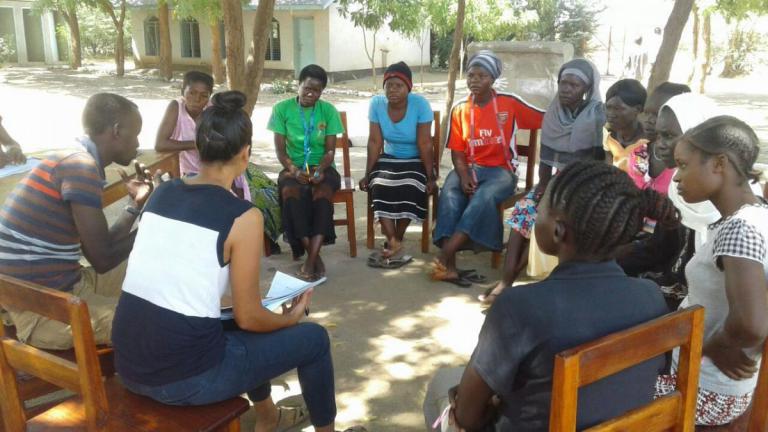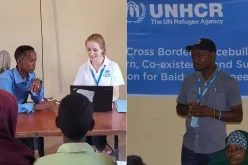A total of 486,460 refugees and asylum seekers are in Kenya today, 86 per cent of whom live in the Dadaab Refugee Complex and in Kakuma Refugee Camp. Most of the refugees come from Somalia and South Sudan, where humanitarian conditions have deteriorated and millions are in need of assistance. The UN Refugee Agency (UNHCR) leads the Kenya operation, with outstanding support from UN Volunteers serving in those camps.
EMPOWERING YOUTH REFUGEES AS VOLUNTEERS
Children and youth constitute approximately 70 per cent of the registered refugee population in Kakuma. The engagement of youth and adolescents at the community level is thus critical for the promotion of peaceful co-existence among refugees and asylum seekers. The UNV/UNHCR project “Enhancing Citizen Security and Refugee Protection through Refugee Youth Volunteers” incorporates aspects of community-based protection to improve people’s capacities, knowledge and resources, so that they can contribute to addressing their own protection needs.
The project focuses on the training and coaching of up to 100 refugee volunteers, who will reach out to the population to assess their needs in the camp and thus contribute to sustainable socioeconomic solutions. To date, 45 refugee volunteers have already been recruited.
The project aims to contribute to finding lasting solutions within the community through regular dialogues on pressing priorities in the camp, while mobilizing as many people as possible to achieve solutions of common interest.
Targeted efforts are being made to encourage the participation of women in the community, through brokering access for women’s groups in formal and informal peacebuilding dialogues, facilitating police-community dialogue with an emphasis on women and family units, and establishing gender-sensitive early warning and community-based conflict monitoring systems, among other activities.
UN Volunteer Associate Field Officer Akie Tanaka (Japan) is currently coordinating the project. “A large portion of the youth population in the camp are neither working nor studying, so it’s important to bring hope for them and make them key contributors to positive impacts in their communities,” she says.
I identify youth outreach volunteers who are willing to bring positive change for their communities, and I have observed how quickly they become motivated and encouraged to serve others as volunteers after the trainings.” UN Volunteer Akie Tanaka (UNHCR Kenya.)
UN VOLUNTEERS AS KEY ASSETS FOR THE REFUGEE RESPONSE IN KENYA
34 UN Volunteers are currently deployed with UNHCR in Kenya, mostly in Nairobi but also in Dadaab and Kakuma. The Dadaab refugee complex has a population of 235,269 registered refugees and asylum seekers.
Rex Laissezfaire Mlotha (Malawi) is a UN Volunteer Associate Community Services who works also with youth. Rex organizes capacity building and training sessions with youth in Dadaab, coordinates leadership participation structures for youth refugees by providing technical support, and conducts camp monitoring visits and offers mentorship to make sure youth voices are heard in decision- making processes related to protection and humanitarian assistance.
Rex shares a moving example of his work:
“During one of the group discussions, I met a young adolescent girl who was hypervigilant and got frightened by the slightest noise she could hear. She didn’t trust anyone. It was understandable, because after her traumatizing female genital mutilation (FGM) experience, she was forcefully married as a second wife to a man who later beat her miserable. Her face alone could tell a long story of suffering. As part of my work to strengthen youth clubs in the camps, I met her regularly during mentorship sessions and I walked with her through a healing experience that put her at the centre of our female youth programme. She is currently an awareness champion who conducts community civic education and campaigns on the negative effects of FGM practices among girls in the camp.”
Many refugees cannot go home because of continued conflict, wars and persecution. Many also live in dangerous situations or have specific needs that cannot be addressed in the country where they have sought protection. In such circumstances, UNHCR helps resettle refugees to a third country.
Catherina Funck (Germany) is a UN Volunteer Associate Resettlement Officer with UNHCR in Dadaab. She gathers background information from refugees that is then submitted to countries of resettlement. She often reflects on her own privileges and understands the importance of advocating for the people living in the camp.
In her own words:
With my work, I help vulnerable refugees to find a new home in a third country. Particularly for those with special medical needs, resettlement is an important opportunity if the treatment is not available in Kenya. In those cases, resettlement saves lives.”

A focus group discussion with women refugees on protection and women’s needs in Kakuma camp, Kenya. (UNV, 2018)
Along with Akie, UN Volunteer Associate Refugee Status Determination Officer Wakeel Ahmad (Pakistan) serves with UNHCR in Kakuma. He conducts field visits, does refugee protection interviews, writes protection needs assessments of Persons of Concern and coordinates meetings with partner and government counterparts.
Wakeel is one of five UN Volunteers currently based in Kakuma. He talks about his motivation: “My goal is to help and work for the most marginalized communities. I resigned from a job in my government and started working in the humanitarian sector in Pakistan. After that, UNV gave me the opportunity to work for refugees and asylum seekers, which greatly enhanced my skills to provide protection for persons of concern.”
The Kakuma camp and Kalobeyei Integrated Settlement have a population of 185,449 registered refugees and asylum seekers. UNHCR works on refugee admission and reception, registration, child protection, prevention of sexual and gender-based violence, education, health, nutrition and sustainable livelihoods, among other priorities. UN Volunteers deployed in Kakuma work primarily on registration, refugee status determination and humanitarian logistics.

